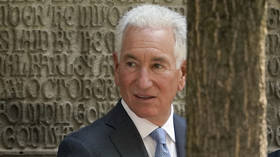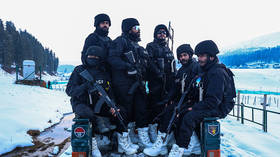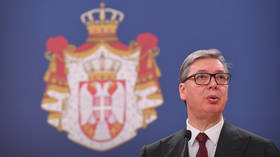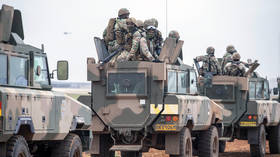Anti-Islamism PEGIDA rally gathers hundreds in Austria
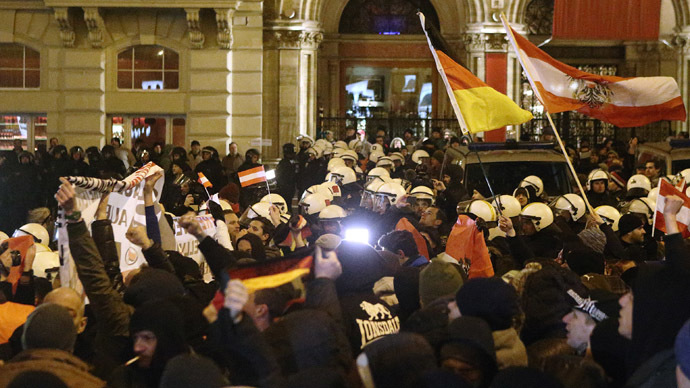
The German-born PEGIDA movement, which lobbies against the Islamization of Europe, has attracted hundreds of supporters and opponents to the streets of Vienna for its first march in neighboring Austria.
READ MORE: ‘Islam is welcome here, but we want to keep our culture’ – PEGIDA to RT
Approximately 250 people marched in the Austrian capital on
Monday, carrying the country’s national flags and chanting:
“We are the people!” They were met by a roughly equal
number of counter-demonstrators, who shouted: “Down with
PEGIDA.”
The faceoff between the sides was avoided with a heavy police
presence. One thousand two hundred officers had been deployed to
maintain public order in Vienna. There were no incidents or
arrests during the rally, an Austrian police spokesman told
Reuters.
Anti-Islam group #PEGIDA holds first Austria march http://t.co/TDqH3Gk5GG@kattaB4@MJoemal19@johnmknoxpic.twitter.com/8OLRFlgnfx
— J (@NatureIco) February 2, 2015
Before the protest, PEGIDA, which stands for Patriot Europeans
Against the Islamization of the Occident, wrote on its Facebook
page that “everyone is welcome – no matter which party,
movement, organization or nationality – everyone who is against
radical Islamism and Shariah law and who wants to make a peaceful
statement.”
A spokesman for the Austrian PEGIDA offshoot, Georg Immanuel
Nagel, told Die Presse newspaper that the time has come to end
the “appeasement policy” for Muslims in the country. He
believes that Austria should introduce a legislation banning
“Islamism” so that those promoting Shariah law could
face punishment in the same way the glorifiers of Nazism do.
Around half a million Muslims currently reside in Austria, which
has a population of 8.5 million mostly of Roman Catholic faith.
The PEGIDA rally took place just a few days after violent
demonstrations by left-wing activists, who were protesting
against an annual ball in Vienna organized by right-wing
politicians. Around 5,000 people took to the streets on Friday,
with police making 38 arrests near the Hofburg palace.
Islamophobia has recently become a hot topic in Austria after a
series of attacks on Muslim women wearing head scarves in Vienna.
The incidents occurred following an announcement which stated
than over 170 people from Austria went to Iraq and Syria to fight
alongside the jihadist group Islamic State (formerly ISIS).
In order to tackle the spread of radical Islam, the Austrian
government came up with a draft law requiring standardized
German-language translations of the Koran and prohibiting foreign
funding of Muslim organizations on its soil.
In Germany, the PEGIDA movement has been holding protests every
Monday in the eastern German city of Dresden since October, as
well as in other major cities.
The rallies, which initially gathered no more than 500 people,
hit record attendance levels of 25,000 following the Charlie
Hebdo Islamist attacks in Paris in January. They have since
broken out of Germany, with minor rallies taking part in Denmark.
READ MORE: ‘Anti-Islamization’ & ‘pro-tolerance’ activists march in Berlin (VIDEO)
The PEGIDA manifesto states that the group is against any form of
extremism, and its leaders have been trying to move from the
fringe of political discourse and cut ties with far-right groups,
including neo-Nazis. At the same time, the group remains at the
center of controversy in Germany, with top politicians, including
Chancellor Angela Merkel, labeling it “xenophobic” and
“racist,” and with media looking for various members’
Nazi ties.
Recently, de-facto PEGIDA leader Lutz Bachmann had to resign
after a photo of him posing as Adolf Hitler was found and posted
by the regional Dresden-based newspaper, Dresdener Morgenpost.
Bachmann maintained that the picture was a satire.
READ MORE: For Lulz? PEGIDA leader Lutz Bachmann steps down after Hitler-style pic emerges
Despite condemning the increasingly popular movement, officially, Berlin has upheld the right of PEGIDA to gather rallies and marches as it stands in line with the country’s fundamental freedoms.



